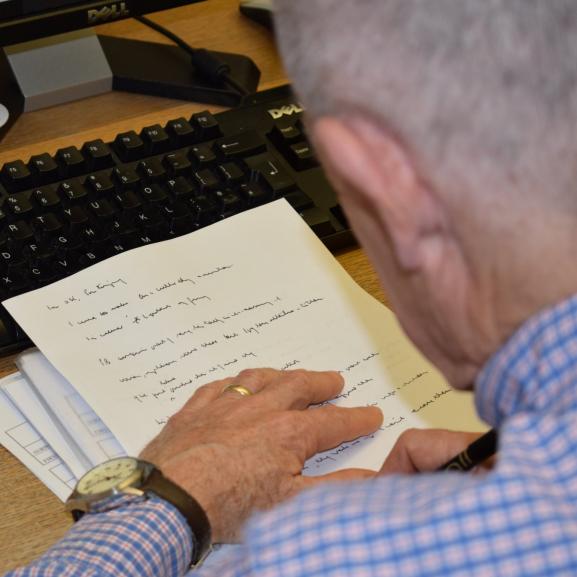Walking the road with survivors of torture
Ben is a Therapist at Freedom from Torture’s North-West centre in Manchester. Read on to know more about what originally drew him to the role as well as the powerful techniques he employs to help survivors of torture to deal with their trauma.
How long have you been working with Freedom from Torture for and what drew you to the organisation?
It was originally recommended to me by my supervisor psychologist when I was a trainee as a great opportunity to do voluntary work in the front line of therapeutic support. I was a bit nervous about applying to work with torture survivors as I wasn’t sure I’d be up to such an important task, but I did and here I am 8 years on. You can safely say it’s been an interesting journey.
What does a typical day at the centre look like for you?
I usually see my first client at 10-11am, and it’s typically 4-5 clients each day, sometimes interspersed with an hour worth of supervision. Then I’ll carry out a bit of admin work, as well as liaise with clients’ GPs or physiotherapists, or with the Legal & Welfare team in London. It’s quite a busy and varied schedule, and I really enjoy the holistic aspect of it.
What’s the best part of your job?
I’m lucky to have such a supportive team. We’ve gone through a lot but people look out for each other. And as I said I love the multi-disciplinary approach of my role. But above all I’m grateful for the tangible difference we’re able to make to people’s lives, which are pretty grim when they arrive, and to have seen many clients coming through and leaving in a much better place.
And the most challenging?
The mental health of our clients is something we always have to manage carefully, as we constantly have to manage risk: most often our clients are feeling suicidal, twice we had to call an ambulance, and we’re also always in touch with their GP. But for me the most challenging aspect is probably the hostile environment culture that’s spread in this country against refugees: when clients say that things here can feel as bad and daunting as the country they had to flee, I find it very hard to lift them up. It is definitely difficult to explain why survivors of torture are still detained for immigration purposes, for instance. They can feel very weighed down by it.
For me the most challenging aspect is probably the hostile environment culture that’s spread in this country against refugees: when clients say that things here can feel as bad and daunting as the country they had to flee, I find it very hard to lift them up.
Can you tell us a bit about the techniques that you commonly use in the therapy room?
Our remit is to practice human-rights trauma-focused therapy. Our approach is very person-centred. Personally, I see it very much as walking the road with them, bearing witness with them. Connecting with them so they can open up about their experience.
I often use EMDR (Eye Movement Desensitization and Reprocessing therapy), which allows clients to package their traumatic memory so is no longer unbearable. It doesn’t work with everyone, and that’s just something you have to accept. But over the years I’ve found it to be very effective: After many unsuccessful sessions trying various techniques, one client told me he felt EMDR was the reason he finally wasn’t feeling suicidal anymore. What I like about it is that its purpose is not to remove the memory altogether but to take the heat out of it.
Our remit is to practice human-rights trauma-focused therapy. Our approach is very person-centred. Personally, I see it very much as walking the road with them, bearing witness with them. Connecting with them so they can open up about their experience.
Could you share any moments that you felt made everything worth it?
The very first client I worked with was very suicidal when we started therapy and I kept seeing him for 2 years. When he left he was in much better shape, and recently a colleague of mine ran into him and found out he’s now managing a pub! I think that is an emblematic example of the impact our work can have.






